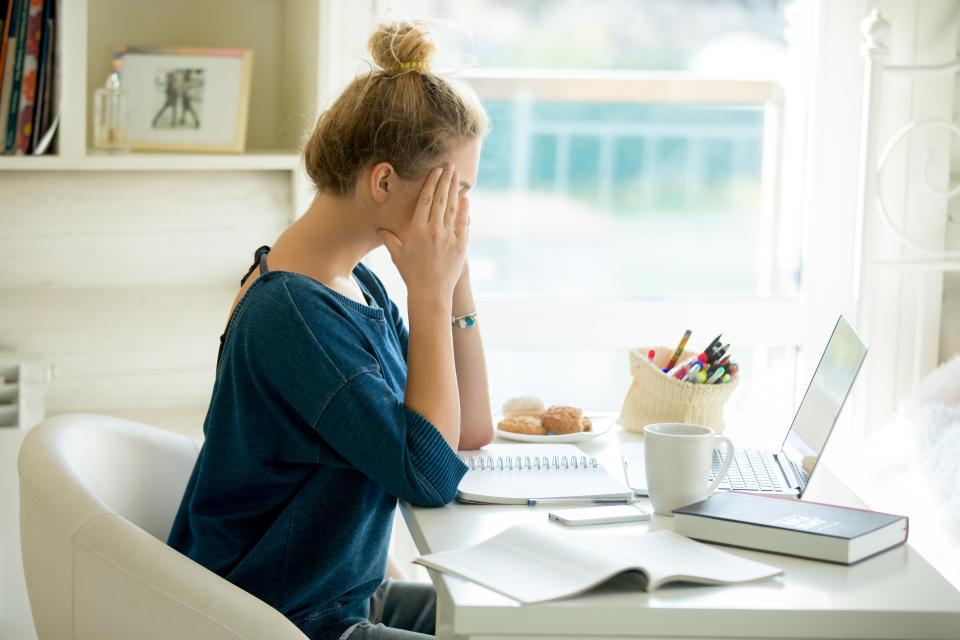Women working from home are still dealing with comments about their appearance

Working from home under lockdown hasn’t been easy. Juggling back-to-back Zoom calls, endless messages from overbearing bosses, loud housemates and childcare — all against the backdrop of a global pandemic and the economic fallout — has left lots of us exhausted.
For many, remote working has meant throwing on a t-shirt and a pair of tracksuit bottoms before logging on to emails, video calls and projects. With so much going on, it’s understandable that our work attire has become less important.
But even with offices closed, workplace sexism is still thriving — and women are still being scrutinised over their appearance, even when working from home.
READ MORE: How gender bias affects feedback and performance reviews
Of a survey of 2,000 people by the employment law firm Slater and Gordon, 35% of women said they had experienced at least one sexist workplace demand since the lockdown was introduced in March.
Most commonly, women were subjected to comments about the way they dressed, including to “look nicer for the team” and to appear more “pleasing” to a client. 34% of women were asked to wear more make-up or change their hair, while 27% were told they should “dress more sexy or provocatively.”
Moreover, nearly 40% of women said these demands were targeted at them or other women in their teams rather than male peers, which left them feeling objectified, self-conscious and demoralised. Despite this, 60% didn’t report the comments to HR — and a quarter agreed to boost their beauty regime for fear of a negative impact on their career.
Appearance-based discrimination is nothing new. Research from the University of Chicago and the University of California, Irvine, has shown women who put more effort into their appearance often earn more. But they also walk a fine line, with women who put too much effort seen as less qualified in traditionally masculine jobs, according to a 2014 study.
“It is categorically wrong for a manager or anyone in a position of power to suggest, even politely, for a woman to be more sexually appealing in the workplace,” said Danielle Parsons, an employment lawyer at Slater and Gordon.
“This is a powerful form of coercion which makes women feel as if they must adhere to the manager’s request and be more visually pleasing to be successful at their job. This is demeaning to women.”
READ MORE: Why women need to stop apologising at work
Although many people have struggled to keep their heads above water during the COVID-19 crisis, the gender inequality gap has remained firm. Over the last few months, women have borne the brunt of childcare responsibilities, household chores and homeschooling, ONS data has shown, leaving them burned out.
Meanwhile, the gender gap has widened in terms of health and wellbeing. Women and mothers have suffered a dramatic decline in wellbeing during the lockdown period and displayed more signs of depression than men.
Single mothers, who are least likely to own a house or a car and have the highest risk of depression, have fared the worst in the labour market, according to research by the University of Oxford. Women were more likely to have seen a reduction to their working hours during lockdown too, with lone parents hit the hardest financially. It’s also safe to assume that some women will have had to shoulder the burden of keeping households financially afloat too, if a partner has been made redundant.
READ MORE: Why the 'motherhood penalty' has been amplified by the lockdown
Despite this, though, women are still being asked to dress “sexier” — and penalised if they don’t wear mascara to a Skype meeting.
“It’s extremely disappointing that we are still having these conversations, particularly during this time when women are juggling a multitude of roles from home, and may be also struggling with childcare responsibilities. This type of archaic behaviour has no place in the modern working world,” Parsons added.
“Requests of this nature are discrimination and unlawful where male counterparts aren’t treated in this way, or where such unwanted requests create a humiliating or degrading environment for women.”

 Yahoo Finance
Yahoo Finance 
